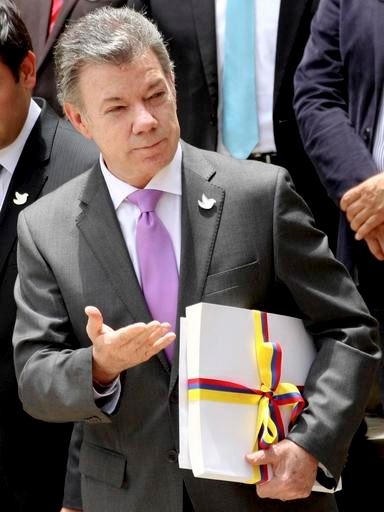 |
| In this Thursday, Aug. 25, 2016 file photo Colombia's President Juan Manuel Santos holds the peace deal with rebels of the Revolutionary Armed Forces of Colombia, FARC after delivering it to Congress in Bogota, Colombia. Colombian President Juan Manuel Santos has won Nobel Peace Prize it was announced on Friday Oct. 7, 2016. (AP Photo/Felipe Caicedo, File) |
BOGOTA, Colombia (AP) — Colombian President Juan Manuel Santos won the Nobel Peace Prize on Friday for his efforts to end Latin America's longest-running armed conflict, an honor that came just five days after voters dealt him a stunning blow by rejecting a peace deal with leftist rebels.
The Norwegian Nobel Committee praised Santos for his "resolute" attempts to stop a civil war that has killed more than 200,000 Colombians and displaced millions since the 1960s. But in a departure from its tradition of honoring both sides of a peace process, the five-member committee conspicuously left out Santos' counterpart, rebel leader Rodrigo Londono, from the honor.
Santos, 65, dedicated the prize to his fellow Colombians, especially victims of the bloody conflict, and said it redoubles his commitment to ending hostilities, something he said he would work toward for the rest of his life.
"I invite everyone to bring together our strength, our minds and our hearts in this great national endeavor so that we can win the most important prize of all: peace in Colombia," Santos said alongside his wife in his first public appearance since winning the Nobel.
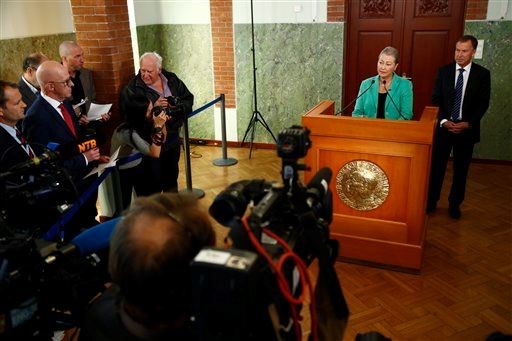 |
| Kaci Kullmann Five, chairman of the Nobel Peace Prize award committee, announces the laureate of Nobel Peace Prize 2016, Colombian President Juan Manuel Santos, during a ceremony in Oslo, Norway, Friday Oct. 7, 2016. Colombian President Juan Manuel Santos won the Nobel Peace Prize for his efforts to end a civil war that killed more than 200,000 Colombians. (Heiko Junge NTB scanpix via AP) |
Santos and Londono — leader of the Revolutionary Armed Forces of Colombia, better known by its Spanish acronym FARC — signed a peace deal last month to end the conflict after more than four years of negotiations in Cuba.
But on Sunday, voters rejected the deal by the narrowest of margins — less than half a percentage point — over concerns that the rebels, who are widely loathed by Colombians for committing scores of atrocities, were getting a sweetheart deal.
Under the accord, rebels who turn over their weapons and confess their crimes would be spared jail, and the group would be reserved seats in congress to help smooth its transition to a political movement.
"The referendum was not a vote for or against peace," the Nobel committee said Friday, insisting the peace process wasn't dead. "What the 'No' side rejected was not the desire for peace, but a specific peace agreement."
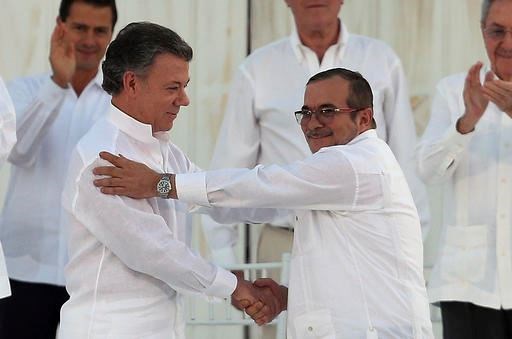 |
| In this Monday, Sept. 26, 2016 file photo, Colombia’s President Juan Manuel Santos, left, and the top commander of the Revolutionary Armed Forces of Colombia (FARC) Rodrigo Londono, known by the alias Timochenko, shake hands after signing a peace agreement between Colombia’s government and the FARC to end over 50 years of conflict in Cartagena, Colombia. Santos won the Nobel Peace Prize Friday, Oct. 7, for his efforts to end a civil war that killed more than 200,000 Colombians. (AP Photo/Fernando Vergara, File) |
Santos, the Harvard-educated scion of one of Colombia's wealthiest families, is an unlikely peacemaker. As defense minister a decade ago, he was responsible for some of the biggest military setbacks for the rebels. Those included a 2008 cross-border raid into Ecuador that took out a top rebel commander and the stealth rescue of three Americans held captive by the rebels for more than five years.
Nobel committee secretary Olav Njoelstad said there was "broad consensus" on picking Santos as this year's laureate — the first time the peace prize has gone to Latin America since 1992, when Guatemalan indigenous rights activist Rigoberta Menchu won. It is Colombia's second Nobel honor after beloved novelist Gabriel Garcia Marquez won the prize for literature in 1982.
Londono, better known by his nom de guerre Timochenko, reacted coolly to the award on Twitter by saying "the only prize to which we aspire" is one of social justice for Colombia, without far-right militias, retaliation or lies. He later congratulated Santos, as well as Cuba, Norway, Venezuela and Chile, which helped facilitate the talks.
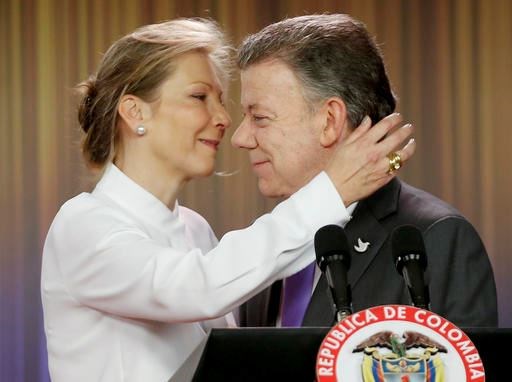 |
| Colombia's President Juan Manuel Santos is embraced by his wife Maria Clemencia Rodriguez after speaking to journalists at the presidential palace in Bogota, Colombia, Friday, Oct. 7, 2016. Santos won the Nobel Peace Prize Friday, just days after voters narrowly rejected a peace deal he signed with rebels of the Revolutionary Armed Forces of Colombia, FARC. (AP Photo/Fernando Vergara) |
Santos also was congratulated by former President Alvaro Uribe, whose U.S.-backed military offensive is widely credited with forcing the FARC into negotiations. Uribe, a hard-line conservative, led the "No" campaign against the peace deal.
"I hope it leads to a change in the accords that are damaging for our democracy," he said on Twitter about the prize.
The award is likely to give new momentum to the peace process, putting pressure on Uribe to rally behind a solution and encouraging the FARC to show greater flexibility after initially dismissing the referendum's results as legally irrelevant.
In Bogota, 20 activists who were camped out since Wednesday in front of Colombia's congress to demand the peace deal not be scuttled, shouted: "Peace deal now!" and "Colombia wants peace!"
"This is a big help, but we're not leaving until there's peace," said Juliana Bohorquez, a 31-year-old artist, upon being awakened before dawn with the news.
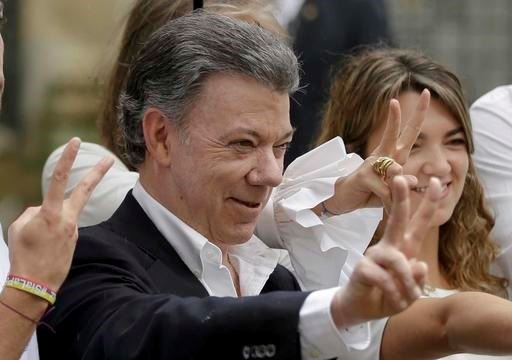 |
| In this Sunday, Oct. 2, 2016 file photo Colombia's President Juan Manuel Santos makes the victory sign after voting in a referendum to decide whether or not to support the peace deal he signed with rebels of the Revolutionary Armed Forces of Colombia, FARC, in Bogota, Colombia. Colombian President Juan Manuel Santos has won Nobel Peace Prize it was announced on Friday Oct. 7, 2016. (AP Photo/Ricardo Mazalan, File) |
In Cuba, FARC and government negotiators committed themselves to listening to the deal's critics even while inviting the U.N. and Latin American governments to send observers to begin implementing security protocols contained in the accord so that a cease-fire in place for weeks doesn't unravel amid the impasse.
"Today we've heard the voice of the world. Now it's time to hear the clamor of all Colombians," chief government negotiator Humberto de la Calle said. "Peace is coming. We can't impede its march."
The FARC's chief negotiator Ivan Marquez was equally emphatic.
"We're not going to destroy what we've designed and that has received so much international praise," he said.
Awarding Santos alone contrasted with the Nobel committee's tradition of honoring both sides in a peace process, as it did in 1994 for an Israeli-Palestinian peace accord and in 1998 for peace talks in Northern Ireland.
The committee recognized that the referendum result had "created great uncertainty" about Colombia's future.
"There is a real danger that the peace process will come to a halt and that civil war will flare up again," it said. "This makes it even more important that the parties, headed by President Santos and FARC guerrilla leader Rodrigo Londono, continue to respect the cease-fire."
Kullmann Five, the committee chair, said the prize should be seen as encouragement to the FARC as well.
"The FARC is obviously a very important part of this process," she told The Associated Press.
Though nominally Marxist, the FARC's ideology has never been well defined. It has sought to make Colombia's conservative oligarchy share power, and prioritized land reform in a country where millions have been forcibly displaced, mostly by far-right militias in the service of ranchers, businessmen and drug traffickers. The FARC lost popularity as it turned to kidnapping, extortion and taxes on cocaine production and illegal gold mining to fund its insurgency.
Santos and Londono met only twice during the entire peace process: last year when they put the final touches on the most-controversial section of the accord — how guerrillas would be punished for war crimes — and last month to sign the accord in front of world leaders and U.N. Secretary-General Ban Ki-moon.
Ban called this year's Nobel Peace Prize a "timely message" to all people working toward national reconciliation.
"This award says to them: You have come too far to turn back now. The peace process should inspire our world," he said.
A record 376 candidates were nominated for this year's award, which carries a prize of 8 million Swedish kronor (about $930,000).
Last year's peace prize went to Tunisia's National Dialogue Quartet for its efforts to build a pluralistic democracy.
The 2016 Nobel Prize announcements continue with the economics prize Monday and literature on Thursday. All awards will be handed out Dec. 10, the anniversary of prize founder Alfred Nobel's death in 1896.
___
Ritter reported from Stockholm. Mark Lewis contributed from Oslo, Norway.
Copyright 2016 The Associated Press. All rights reserved.
This material may not be published, broadcast, rewritten or redistributed.





